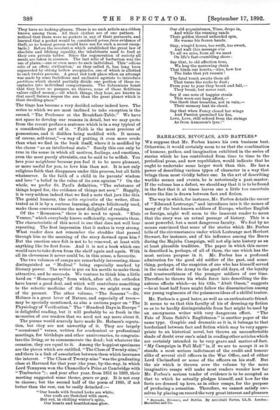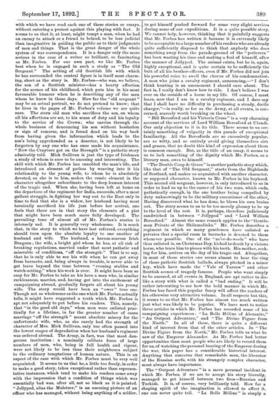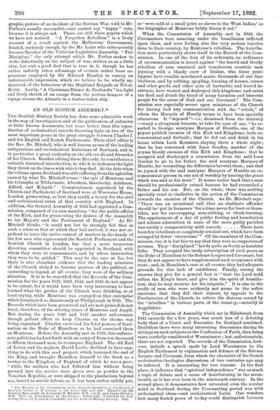BARRACKS, BIVOUACS, AND BATTLES.* WE suppose that Mr. Forbes knows
his own business best. Otherwise, it would certainly seem to us that the combination of humour, pathos, and imagination exhibited in the series of stories which he has contributed from time to time to the periodical press, and now republishes, would indicate that he ought to undertake some larger work than this. He has a power of describing various types of character in a way that brings them most vividly before one. In the art of describing warlike scenes and events, he is notoriously a past-master. If the volume has a defect, we should say that it is to be found in the fact that it at times leaves one a little too uncertain where the line is drawn between fact and fiction.
The way in which, for instance, Mr. Forbes details the career of "Edmund Lestrange," and introduces into it the names of many of the best-known soldiers of Europe, whether English or foreign, might well seem to the innocent reader to mean that the story was an actual passage of history. This is a most powerful, but a most dangerous faculty. We feel by no means convinced that some of the stories which Mr. Forbes tells of the circumstances under which Lestrange met Herbert Stewart, for instance, and of his influence among the Boers during the Majuba Campaign, will not slip into history as an at least plausible tradition. The paper in which this career is described is, perhaps, of all of them, the one which has the most serious purpose in it. Mr. Forbes has a profound admiration for the good old soldier of the past, and some- thing, perhaps, of the suspicion of one who has himself served in the ranks of the Army in the good old days, of the loyalty and trustworthiness of the younger soldiers of our time. Therefore he throws his whole force into describing the dis- astrous effects which—as his title, " Absit Omen," suggests —he at least half fears might follow the dissemination among our young regiments of the poisonous ideas of a skilful traitor.
Mr. Forbes is a good hater, as well as an enthusiastic friend. It seems to us that this faculty of his of dressing-up fiction so as to be hardly distinguishable from fact might be used by an anonymous writer with very dangerous effect. "The Fate of Nana Sahib's Englishman" is another paper of the same type. Graphic and dramatic as it is, it belongs to that borderland between fact and fiction which may be very appro- priate to an historical novel, but throws an uncomfortable shade of doubt over one's mind in reading other articles which are certainly intended to be very grave and matter-of-fact. "My Campaign in Pall Mall" is, if we are to accept it as it stands, a most serious indictment of the credit and honour alike of several civil officers in the War Office, and of either Lord Chelmsford or some of the officers on his staff. But the air which is thrown over the volume by the more imaginative essays will make most readers wonder how far Mr. Forbes's serious tender of evidence is to be accepted as that to which he actually pledges himself, and how far the facts are dressed up here, as in other essays, for the purpose of producing a sensation. Therefore, we cannot satisfy our. selves by placing on record the very great interest and pleasure
* Barracks, BiTOUILCA, and Battles. By AseSibald Forbes, LL.D. London : Macmillan and Co.
with which we have read each one of these stories or essays, without entering a protest against this playing with fact. It seems to us that it, at least, might tempt a man, when he had an enemy to attack or a friend to belaud, to be less judicial than imaginative in guiding the public as to their judgments of men and things. That is the great danger of the whole system of war correspondents. It is a danger only the more serious in the case of a writer so brilliant, so fascinating as Mr. Forbes. For our own part, we like Mr. Forbes best when he is engaged in such a study as "The Old Sergeant." The setting of old Scottish life with which he has surrounded the central figure is in itself most charm- ing, short as the story is. Mr. Forbes—who was, we believe, the son of a Scottish minister—has a hearty affection for the scenes of his childhood, which puts him in his most favourable humour when he is describing any of the men whom he knew in those days. How far the "old sergeant" may be an actual portrait, we do not pretend to know; that he lives in the pages of Mr. Forbes's volume we are quite sure. The stern old man who sacrifices the son, on whom all his affections are set, to his sense of duty and his loyalty to the service of the Crown ; who carries through the whole business of denouncing his son without hesitation or sign of remorse, and is found dead on his way back from having given the information which leads to the son's being apprehended as a deserter, is not likely to be forgotten by any one who has once made his acquaintance. "Bow the Crayture got on the Strength" is a pathetic story admirably told. Mick Sullivan is just the type of Irishman a study of whom is sure to be amusing and interesting. The skill with which Mr. Forbes has ennobled the man's life, and introduced an element of pathos by weaving into it his relationship to the young wife, to whom he is absolutely devoted, as she is to him, makes the comic element in the character altogether subordinate to the deep human interest of the tragic end. When she, having been left at home on the departure of the regiment for India, succeeds, after a most gallant struggle, in fighting her way out to the East only in time to find that she is a widow, her husband having most heroically sacrificed his life just before her arrival, one feels that there are in that story the elements of a plot that might have been much more fully developed. The prevailing tone of almost all of Mr. Forbes's stories is intensely sad. It is generally very wholesome. It is much that, in the story to which we have last referred, everything should turn upon the absolute loyalty to one another of husband and wife. The husband, a harum-scarum Irish Dragoon ; the wife, a bright girl whom he has, at all risk of breaking regulations, married under that most pathetic and miserable of conditions, "off the strength." That is to say, that he is only able to see his wife when he can get away from barracks, and, being always in trouble, is never able to get leave beyond the time between "evening stables and watch-setting," when his work is over. It might have been so easy for Mr. Forbes to take as his hero a man who, in similar recklessness, marries, and, having got into the excitement of campaigning abroad, gradually forgets all about his young wife. The story would have been an " ower" true one. Though not so wholesome as the one which Mr. Forbes actually tells, it might have suggested a truth which Mr. Forbes is apt not adequately to put before his readers. This, namely, that "in the good old days," when men were enlisted prac- tically for a lifetime, in far the greater number of cases marriage "off the strength" meant absolute misery for the unfortunate wife, who, as she rarely had the strength of character of Mrs. Mick Sullivan, only too often passed into the lowest stages of degradation when her husband's regiment was ordered abroad. The Army, in fact, was that most dan- gerous institution : a nominally celibate force of large numbers of men, who, being in full health and vigour, were not likely to be less than their neighbours subject to the ordinary temptations of human nature. This is an aspect of the case with which Mr. Forbes must be very well acquainted. It seems to us that he, a little too freely, in order to make a good story, takes exceptional rather than represen- tative instances, which tend to make his readers come away with the impression that a condition of things which was essentially bad was, after all, not so black as it is painted. " Jellypod, alias the Muleteer," is an amusing picture of an officer who has managed, without being anything of a soldier, to get himself pushed forward for some very slight services during some of our expeditions. It is a quite possible story. We cannot help, however, thinking that it painfully suggests that Mr. Forbes has written it because it is extremely likely to be acceptable to a large number of his readers who are already quite sufficiently disposed to think that anybody who does something away from the parade-ground of the " potterers " has been wasting his time and making a fool of himself, after the manner of Jellypod. The animal exists, but he is, again, highly exceptional, and is quite certain to be sufficiently the butt of all his brother-officers, even if Mr. Forbes did not join his powerful voice to swell the chorus of his condemnation. A man who joins a cavalry regiment, announcing,—" I don't think hunting is an amusement I should care about. The fact is, I really don't know how to ride. I don't believe I was ever on the outside of a horse in my life. Of course, I must learn, now that I am in a cavalry regiment, and I dare say that I shall have no difficulty in purchasing a steady, docile charger,"—is really, so far as the Army, at all events, is con- cerned, scarcely worth breaking on the wheel.
"Bill Beresford and his Victoria Cross" is a very charming account of the services of Lord William Beresford at Ulundi. Our only objection to it is its title. There seems to us cer- tainly something of vulgarity in this parade of exceptional familiarity. All the Beresfords are so excessively popular, are so witty, and so entirely avoid giving themselves airs and graces, that no doubt this kind of expression about them is common enough. But, as the title of an essay, it seems to us to lack something of the dignity which Mr. Forbes, as a literary man, owes to himself.
"The Double Coup de Grace" is another pathetic story which, like that of "The Old Sergeant," starts from the Highlands of Scotland, and makes us acquainted with another character, or supposed character, known to Mr. Forbes in his boyhood. This second old sergeant, however, is only introduced to us in order to lead us up to the career of his two sons, which ends, pathetically enough, in the one brother being compelled by duty unknowingly to be the military executioner of the other. Having discovered what he has done, he blows his own brains out. The story seems to us to be too merely gloomy to be up to the level of the rest. It is, perhaps, therefore judiciously sandwiched in between " Jellypod " and "Lord William Beresford." Almost the same remark applies to the "Gentle- man Private of the Skilamalinks." Mr. Forbes describes a regiment in which so many gentlemen have enlisted as privates that a special room in barracks is devoted to them whenever possible. One of the " ne'er-do-weels " who have thus enlisted is, on Christmas Day, kicked to death by a vicious horse, who tears him to pieces with his teeth. His mother, seek- ing for him, arrives on the day of his tragic end. Altogether, in most of these stories one seems almost to hear the ring of those pathetic Scottish ballads, always pitched in a minor key, which have made the "Vale of Yarrow" and other Scottish scenes of tragedy famous. People who want simply to be amused, at all events in England, are apt rather to dis- like a story with what is called a "bad ending." It will be rather interesting to see how the bold manner in which Mr. Forbes has faced this popular fancy will affect the readers of his otherwise very attractive volume. In all respects but this, it seems to us that Mr. Forbes has almost too much written just what was likely to be popular. We have next to notice three articles in which Mr. Forbes has recorded some of his campaigning experiences : "La Belle Helene of Alexanite," "An Outpost Adventure," and "The Divine Figure from the North." In all of these, there is quite a different kind of interest from that of the other articles. In "The Divine Figure from the North," Mr. Forbes tells us what he saw of the Emperor Alexander. As Mr. Forbes had better opportunities than most people who are likely to record them for us, of watching the personal bearing of the Emperor during the war, this paper has a considerable historical interest. Anything that concerns that remarkable man, the liberator of the Russian serfs, with his strangely complex character, must always have importance.
The "Outpost Adventure " is a mere personal incident in which Mr. Forbes, if we are to accept his story literally, managed to get himself between two fires—Russian and Turkish. It is, of course, very brilliantly told. How far a shaping spirit of the imagination is allowed to affect it, one can never quite tell. "La Belle Helene" is simply a
graphic picture of an incident of the Servian War, told in Mr. .Forbes's usually successfal,—one cannot say " happy " vein, because it is always sad. There are still three papers which we have not noticed. "A Forgotten Rebellion" is a lively account of a revolt against the Melbourne Government, headed, curiously enough, by the Mr. Lalor who subsequently became Speaker of the Victorian Legislative Assembly. "Fire Discipline," the only attempt which Mr. Forbes makes to write didactically on the subject of war, strikes us as a little thin, but with a good deal that is true in it, though he has rather unfairly taken advantage of certain rather loose ex- pressions employed by Sir Edward Hamley to convey an unfavourable impression, which we believe to be wholly un- deserved, of the behaviour of the Highland Brigade at Tel-el- Kebir. Lastly, "A Christmas Dinner de Prof undis "is a light and lively sketch of an escape from the serious dangers of a voyage across the Atlantic in a timber-laden ship.




































 Previous page
Previous page